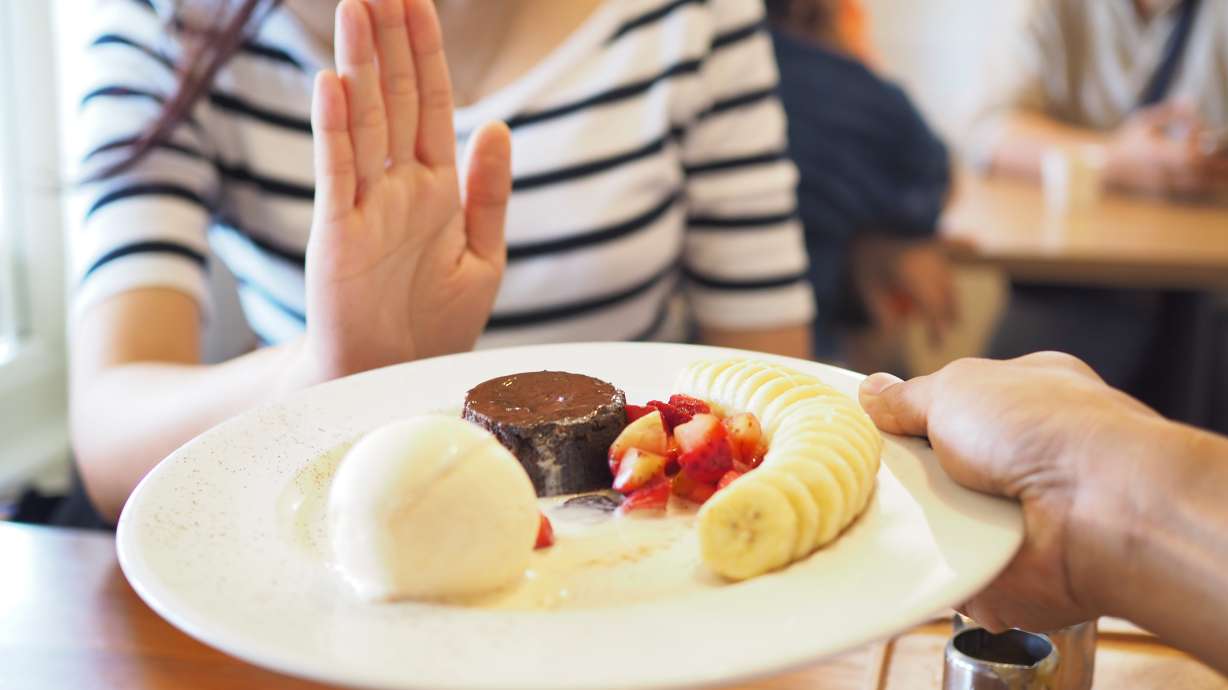Estimated read time: 5-6 minutes
This archived news story is available only for your personal, non-commercial use. Information in the story may be outdated or superseded by additional information. Reading or replaying the story in its archived form does not constitute a republication of the story.
SALT LAKE CITY — Many New Year's resolutions include becoming healthier in one way or another.
A popular diet challenge has emerged the last few years which has people "quitting sugar" altogether. But do you really need to eliminate all sugar from your diet to lead a healthy lifestyle? Registered dietitians shared their thoughts on quitting sugar this new year.
To start, Amy Good, registered dietitian from the Toledo Center for Eating Disorders, says "Sugar is an umbrella term that can mean a lot of different things to a lot of different people. When someone says to me 'I'm cutting out sugar,' I have no idea what that means to them."
To some, sugar might be only added sugars, which include foods like candy, soda, cake, ice cream, cookies, chocolate, pastries, pies and so on. To others it might go so far as to include entire food groups like fruit and dairy.
Good goes on to say, "In general, sugars are carbohydrates and are necessary for survival. They are our bodies' preferred fuel source and provide us with short-term energy. Carbohydrates are also our only source of fiber, which is vital for a healthy gut."
Getting away from the all-or-nothing, good-or-bad mentality
Sarah Pflugradt, registered dietitian nutritionist of Salubrious RD says we live in an all-or-nothing diet society, and that needs to change.
"Those who cut out all sugar leave behind so many good foods like fruit and dairy. We need to educate on eating so much added sugar and how it contributes to inflammation," Pflugradt says. "Keeping your added sugar below the American Heart Association recommendation is a great way to enjoy all the yummy foods but still stay within a healthy boundary."
Registered dietitian Sarah Schlichter of Bucket List Tummy says villainizing sugar contributes to a good-and-bad food mentality, which can lead to feelings of guilt or shame when someone eats something considered "bad."
"This tarnishes a person's relationship with food and teaches them to make decisions based on external rules and factors rather than intuition," she says. "When you're making a decision based on something you want and enjoy, you realize that if you ate high amounts of sugar all the time, you probably wouldn't feel your best. Whereas, if you include it moderately you'll find that you also crave and choose other nutrient-dense foods, as well. I tell my clients to focus less on the individual ingredients and more on the overall pattern of intake and health behaviors, since health is far from 'all-or-nothing.'"
Registered dietitian nutritionist Kelsey Lorencz, of Simply Nourished Home encourages people to stop fixating on how horrible certain ingredients are and look at the diet as a whole instead.
"If all you eat is sugary foods, you will likely feel those health consequences. Eating sugar — yes, even refined added sugars — is not dangerous or unhealthy when consumed as part of a diet that includes several other nutrient-dense foods."
"When we consider health, it's so important to consider every aspect of ourselves. By not demonizing sugar or trying to completely cut it out, we can allow it to be an enjoyable part of a varied diet, not an emotionally consuming ingredient," she adds.
How to fit sugar into a healthy lifestyle
Registered dietitian nutritionist Lauren Harris-Pincus, of NutritionStarringYOU.com and author of "The Protein-Packed Breakfast Club," suggests following the American Heart Association guidelines of 24 grams of added sugar per day for women, or 36 grams for men.
"Choose wisely and really enjoy what you choose," she says. "Make sure the bulk of your diet includes produce, nuts, beans, seeds, whole grains and lean proteins so the sugar you do eat is merely an addition to a nutritious diet."
Registered dietitian nutritionist KeyVion Miller, of themillerskitchen.com, believes a true healthy lifestyle leaves room for a little sugar.
"It can actually be the difference between someone drinking milk (dairy or non-dairy) or eating yogurt," Miller says. "Quite honestly, plain yogurt is pretty boring! Adding a teaspoon of honey or maple syrup could be that difference maker in adding probiotics and calcium to someone's diet. I think this is so important when we know many people fall short of calcium and live, active cultures to support our gut health."
Registered dietitian Sarah Chapel says a healthy lifestyle is all about balance.
"A diet that is completely sugar-free would be void of all fruit, whole grains and dairy — foods we know offer many nutritional benefits," Chapel says.
She suggests, instead, taking an honest look at how many foods in your normal diet have added sugar.
"The fancy sugary coffee drink, the 'nibbles' here and there, your overall portions of sweet stuff. Eliminating all sugar isn't realistic or encouraged. Instead, figure out your norm and decrease. Used to having ice cream after dinner? Reduce to a 1/2 cup portion or try fruit or yogurt."
My No. 1 tip to keep added sugar intake in a reasonable range while still enjoying your food is to cook from scratch at home when possible. This way you are in charge of what goes in your food — including how much added sugar. Sometimes it may be the full amount when baking a birthday cake, while other times you might choose to swap out sugary cereal for some homemade oatmeal.
The main thing to remember is that what you eat is your choice and that it's not only OK, but it's definitely possible to include some sugar in your diet and be healthy at the same time.










